So I put Google and Bing in the ring: Guess who won?
Microsoft's new idea -- to get you to compare Google and Bing -- is a sturdy one. So I tried it. With an interesting result.

Googling seems to be such an automatic act -- like shaving, or weeping at humanity's myopia -- that I am not even conscious of what my searches are.
So along comes Microsoft's search machine with a large-hearted promotion, asking you to truly think about whether it could be better than the great Lord Google.
Called Bing It On, the promotion asks you to offer up a search and then look at a side-by-side comparison of the results, in which the identities of the search engines are hidden. Then you vote on which results are better. You do this several times, in a best-of-five-searches challenge.
How could one resist? This isn't like those soda challenges on TV. They don't just show you the edited versions where their own beverage wins. This is true justice, something of which we're all so very much in need -- especially Apple.
It is in the nature of my business that I am forced to Google my own name. So I started there. One search offered images that were of me. The other, sadly, offered images only one of which was of me. This was easy.
Then I thought I'd go existential. I searched "Reasons for living."
Yes, it seems a little deep. But I figured if these two engines had true sensitivity, they would fight to give me meaningful answers. Again, one was better than the other.
Both gave far too much value to a song by Duncan Sheik called "Reasons for Living." Do I look to you like someone whose life can be made more meaningful by Duncan Sheik?
However, one of the winner's results offered, quite magically: "Reasons for Living in Spain." This, bizarrely, is a notion I was discussing with someone merely the other day. How could this search engine know?
What next? I chose "Is Bing better than Google?" Oddly, I expected a little fixing here. I expected it to be entirely obvious which algorithm was going to offer me a hosanna toward one or the other home team.
I didn't find one, so I called it a draw.
Fourth, I thought of something topical. I merely searched "Bill Clinton." Naively, I expected some political bias -- or perhaps at least some obviously skewed nuance.
If it was there, I didn't see it. So again I called it a draw.
Finally, I offered something entirely enigmatic. If I was going to fall in love with one of these two, might one show a little wit and imagination?
So I searched "Tell me what I should do next." Yes, just that. I fancied that if the ultimate goal of a search engine was to know you intimately -- well, at least that's what Eric Schmidt has always made me believe -- then it would instinctively know what I had in mind.
And this was the point at which the search engines truly had me flummoxed. One offered me, as the first result: "Who can tell me what I should do next when I meet this situation." This was bad enough. This was impersonal enough.
But it was nothing compared with the other search engine, which merely showed its political skirts. For its first result was "Tell the world, what should Obama do next?"
Excuse me, oh, secret search engine? I am asking you what I should do next and you are putting the president's issues above mine? Begone with you, Google. Yes, this was Google.
You might now wonder who won. I had declared three winners and two ties.
Well, to Bing's chagrin, it was Google who won, despite its political offering. It was Google that knew I had discussed living in Spain. You might imagine I did this by Gmail. You might imagine that I had Googled something about living in Spain. Neither is the case.
So, in this instance, it was close. There really didn't seem to be all that much difference. Yet the Googlies had it.
The folks at Bing were depressed. When they presented my results, they said: "Google may have won this round, but others picked Bing Web search results over Google, nearly 2 to 1 in blind comparison tests." (Now that sounds like a soap powder ad from the '70s.)
BingItOn asked me to offer it a rematch. Perhaps I will.

